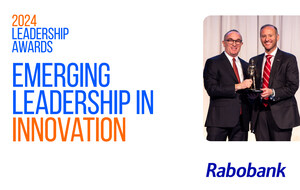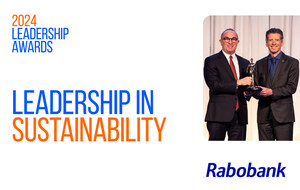Rabobank Report: The Dangerous Attractions of Private Labels
A Delicate Balance for Food Suppliers Producing Both Brand and Private Label
NEW YORK, June 27, 2012 /PRNewswire/ -- A new report authored by Rabobank's global Food & Agribusiness Research and Advisory group looks at the growing private label market, especially those produced by food suppliers who also produce B-brands. The "Producing Both Brands and Private Label" report says that co-production of B-brands and private label (i.e. "dual tracking") is a fairly risky strategy which can pay off, but only if the private label part of the business is economically viable on its own and is fully embedded in the supplier's strategy.
Key Points of the Report
Rabobank's report says that private label goods, also known as own label goods, are set to double their market share to half of all goods sold in supermarkets by 2025. This presents a particular challenge for the "B-brands", those second-tier brands that lack real traction with consumers. These brands already suffer from overcapacity and being able to make the most efficient use of their assets is crucial to their profitability. As a result, they will have to focus on cutting costs and find new strategies to maintain production capacity.
One option is to adopt an "if you can't beat them, join them" approach and move into producing private label products as well – but it is a risky strategy. As the pressure on smaller, second-tier suppliers rises, many will look to private label goods as a way to retain their scale and make the best use of their production facilities. By locking in new private label supply contracts, they may be able to offset, or at least alleviate, the pressure on their branded production volumes.
However, while this may work in the short term, it is not as straightforward a strategy as it might appear, says Rabobank analyst Sebastiaan Schreijen.
The danger for those that adopt a dual tracking approach, as the strategy is known, is that they weaken their bargaining position in relation to their branded products, which rests on the information asymmetry between supplier and retailer as to the supplier's cost base, pricing structure, and innovation pipeline. Private label suppliers have to disclose more of this information, so dual trackers may find their negotiation position undermined with potentially detrimental impact on their profitability levels and brand power.
"Dual-tracking can pay off but only if the private label part of the company is a viable business in its own right and is thoroughly embedded in the supplier's organization," stresses Rabobank analyst Schreijen.
Schreijen outlines a number of strategies to make dual-tracking work:
- Firewalls: By using completely independent sales teams, activity-based cost accounting or splitting the branded and private label businesses by geography and/or market segment, the brand and private label production can coexist, allowing the dual tracker to benefit from the economies of scale but making it difficult for food retailers to back them into a corner.
- Opportunistic: Brand suppliers may fill spare production capacity on an ad hoc basis. This makes it difficult for a food retailer to get a grip on the dual tracker but it can increase earnings volatility.
- Defensive: A private label specialist may be using fancy brands to augment the overall product offering and facilitate the needs of specific customers. Typically, the supplier is not supporting these fancy brands with any marketing effort.
- Category Management: Consumer knowledge of the brand supplier may prove a valuable asset in order to maximize the shelf return for the food retailer by offering different price points, creating a win-win situation for both retailer and brand supplier.
Rabobank is a global financial services leader providing wholesale and retail banking for the food and agriculture industry, asset management, leasing, real estate services, and renewable energy project financing. Founded over a century ago, Rabobank today is one of the largest banks in the world, with nearly $1 trillion in assets and operations in over 40 countries, and ranks among the top rated private banks by S&P and Moody's. In North America, Rabobank is a premier bank to the food, beverage, and agribusiness industry and a leading financier of renewable energy and energy infrastructure projects. www.Rabobank.com
SOURCE Rabobank
WANT YOUR COMPANY'S NEWS FEATURED ON PRNEWSWIRE.COM?
Newsrooms &
Influencers
Digital Media
Outlets
Journalists
Opted In






Share this article